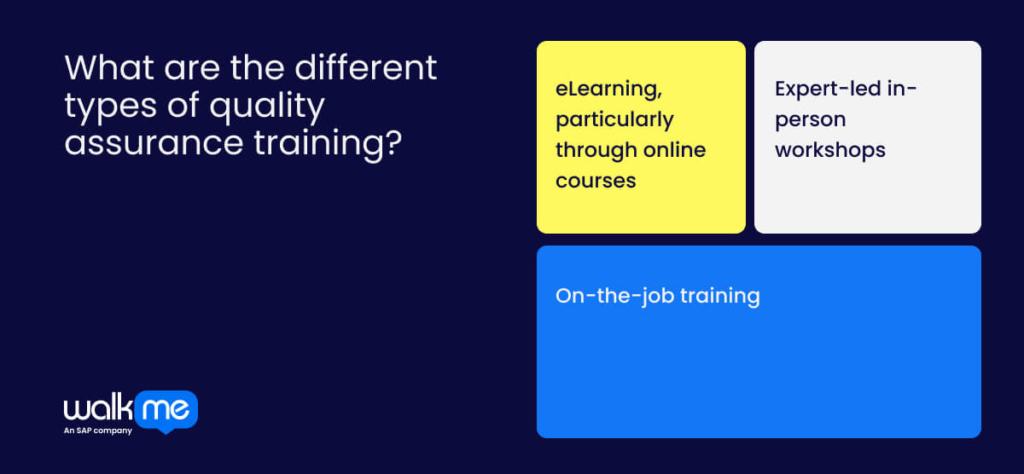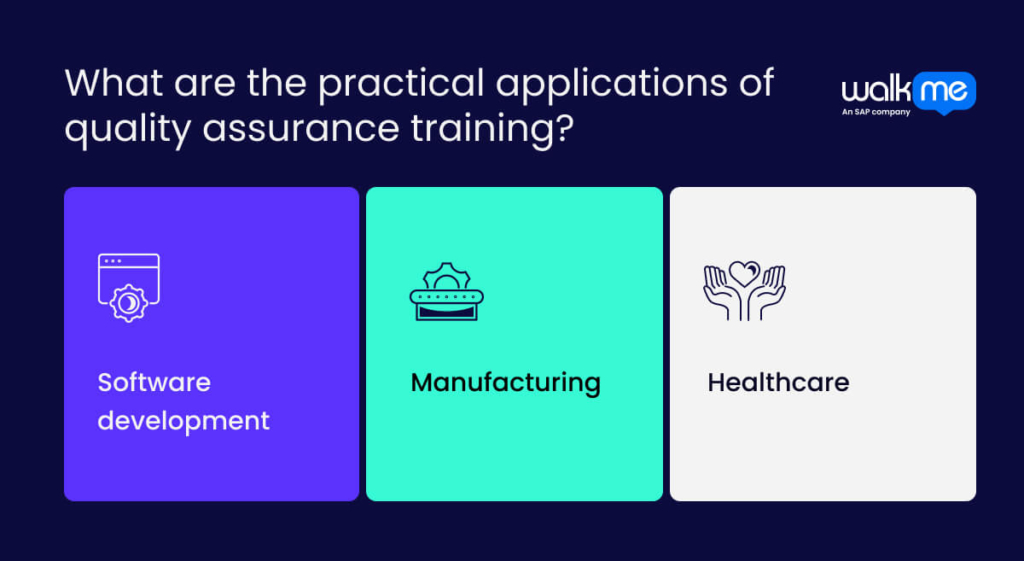Technology has transformed quality assurance over the past decade, ushering in the “Quality 4.0” era, a new type of employee training that blends digital solutions with traditional practices.
This term, coined by ASQ and BCG, highlights integrating digital solutions with traditional total quality management (TQM) practices. However, human expertise remains essential despite the growing reliance on digital tools.
As a result, quality assurance training has never been more important. This highlights the need to balance advanced technology and skilled professionals to maintain high-quality standards.
This article will explore the key elements of quality assurance training for businesses today. It will define QA training, examine effective delivery methods, and explain how QA training applies in three key industries where it is particularly vital.
What is quality assurance training?
Quality assurance training equips participants with the skills and tools to uphold and improve organizational quality standards.
It helps individuals understand their roles, identify areas for improvement, and implement strategies for better product or service quality. QA training is crucial across engineering, healthcare, software, manufacturing, and food services industries.
Key training topics include:
- Quality management principles
- Regulatory requirements
- Process improvement methodologies
- Lean Six Sigma
- Quality auditing
- Root cause analysis
- Risk management
- Quality standards
According to Gartner, quality assurance practices should no longer be centralized within quality management. Instead, quality skills must be spread throughout the organization, making QA training vital for upskilling and reskilling, as well as continuous employee training.
What are the different types of quality assurance training?

In this section, we’ll introduce three key types of training for achieving quality assurance excellence:
- eLearning, particularly through online courses
- Expert-led in-person workshops
- On-the-job training
These approaches can be further adapted to various learning styles, such as examinations, simulation training, cross-training, and collaborative learning methods.
Interactive eLearning (online courses)
Interactive eLearning through online courses offers an effective and efficient way to deliver QA training, with key benefits of flexibility, scalability, and consistency.
These courses align with the rigorous standards required in QA roles, making them a valuable resource for businesses of all sizes.
While some companies may create custom training packages using an in-house learning management system, others can take advantage of online courses covering quality assurance theory.
Online courses typically focus on specific aspects of QA training, and while many are entry-level, specialized providers cover niche areas such as:
- Software testing
- Lean Six Sigma (yellow, green, black)
- Information systems auditing
- QA in project management
Healthcare QA basics - AI for quality assurance
- Statistical process control
- Introduction to ISO standards
- Pharmaceutical software testing
Platforms like Coursera, Udemy, and others provide these valuable resources.
eLearning offers the advantage of self-paced learning but only addresses the theoretical aspects of QA training. To be effective, online course graduates should also engage in on-the-job training.
Expert in-person instruction
Like any technical training, learning from experts is a “must” when learning about quality assurance. After all, some learning outcomes are difficult to achieve in remote training and development. In-person training supports immediate feedback and clarification, collaborative activities, and group discussions, all of which help participants understand the breadth of issues for quality assurance in their sector.
In-person training is especially important for topics with a significant practical element. For example, laboratory-based work, manufacturing, food processing, and healthcare all need in-person training.
In-person training can be expensive compared to more generic online courses. However, the investment is likely to be worthwhile. In the space of a few days, in-person training can upskill QA professionals to the latest standards and skills.
Look out for courses that are partnered with recognized validation bodies.
On-the-job training
Quality assurance training must blend practical and theoretical elements, as emphasized throughout this article. Therefore, all QA professionals must undergo both on-the-job and off-the-job training.
On-the-job training provides a hands-on approach, allowing QA professionals to learn by doing, observe experienced colleagues, and receive immediate feedback on their performance. Some programs integrate on-the-job training with real-world scenarios, helping to strengthen newly acquired skills and deepen understanding of QA principles.
This approach benefits employees at various career stages through short-term apprentice placements, entry-level recruitment schemes, or senior roles. Relevant industries include healthcare, banking, insurance, and software.
What are the practical applications of quality assurance training?

The practice of quality assurance varies across industries, which is why we’ll examine how QA training is applied in different sectors.
In this section, we’ll explore three key industries where QA training is essential:
- Software development
- Manufacturing
- Healthcare
Large businesses in these sectors typically employ staff with “quality assurance” in their titles, such as QA managers, compliance leads, or quality analysts.
These professionals are often the first to receive top-tier training. However, as we’ll see, QA training also benefits many other individuals within an organization.
Software development
In software development, quality assurance (QA) training programs equip staff to identify and address issues in complex software systems.
Software products can contain defects, vulnerabilities, or errors without effective QA, leading to system failures, security breaches, or financial losses. Therefore, QA training is crucial for software developers, testers, and QA engineers to learn industry best practices, testing methodologies, and quality standards. This ensures the delivery of reliable, secure, and user-friendly software products.
However, training staff in software QA comes with challenges, such as keeping pace with rapidly evolving technologies and ensuring consistent testing approaches across diverse development teams.
How to implement it
Here are some top tips for implementing an effective quality assurance training program:
- Ensure onboarding training for test engineers covers key areas like continuous integration, code review, and test automation. Depending on their experience, use a mix of in-person training, online courses, and collaborative methods.
- Offer hands-on testing workshops throughout the year. Host regular sessions where developers and QA engineers collaborate on real-time software testing, focusing on practical exercises and problem-solving.
- When updating your QA systems, ensure staff receive proper training. Experienced test engineers can get up to speed through online courses.
Manufacturing
In the manufacturing industry, quality assurance (QA) processes are crucial for ensuring product quality, safety, and compliance with regulatory standards. Without effective QA, manufacturing processes can lead to defects, waste, costly product recalls, and potential reputational damage and legal liabilities.
Numerous roles within a manufacturing business require QA training, including production operators, quality inspectors, and manufacturing engineers. These professionals need to be equipped with knowledge of quality control techniques, process improvement methodologies, and regulatory requirements.
Achieving consistency across production lines, driving continuous improvement, meeting customer demands, and adapting to changing industry regulations can be challenging. However, well-trained QA staff help ensure smooth and efficient operations.
How to implement it
To enhance your QA training in manufacturing, consider the following strategies:
- Provide staff with comprehensive materials covering specialized theories and methods. Concepts like root cause analysis, failure mode, effects analysis, and statistical process control can significantly improve workers’ ability to identify and address issues early.
- Offer briefings that focus on the customer side of quality. In-person workshops can teach supplier quality management, guiding employees to evaluate and select reliable suppliers, monitor incoming materials, and maintain high standards across the supply chain.
- Leverage digital transformation to your advantage. Technologies like the Internet of Things (IoT), Artificial Intelligence (AI), and big data analytics are revolutionizing QA. Ensure your staff is well-versed in the relevant software tools and the core principles of modern QA practices.
Healthcare
Healthcare is a critical area for quality assurance. Healthcare QA ensures patient safety, effective treatment, and regulatory compliance throughout research and care delivery.
Without proper QA, healthcare facilities risk medical errors, adverse events, or breaches in patient confidentiality, which can lead to compromised patient outcomes and legal consequences. QA training is essential for healthcare professionals, including physicians, nurses, and medical technicians, to understand clinical best practices, infection control protocols, and patient safety measures.
Challenges in healthcare QA training include fostering interdisciplinary collaboration, adapting to rapid technological changes, and navigating complex healthcare regulations and accreditation standards.
How to implement it
To enhance the QA training in your healthcare organization, consider these strategies:
- Ensure QA staff continually educate on regulatory compliance, staying updated on regulations like HIPAA and FDA standards to maintain alignment with best practices.
- Provide hands-on workshops with experts focusing on patient safety, error reporting, infection control, and adherence to healthcare regulations to improve outcomes.
- Incorporate simulation training, particularly in situ simulations, to help staff practice QA in high-pressure situations, offering valuable real-world experience.
Building a stable future with quality assurance training
Investing in quality assurance (QA) training is crucial for nurturing an organization’s culture of excellence and operational efficiency.
Tailoring training programs to align with your business’s specific needs, industry standards, and regional regulations ensures that your workforce is well-prepared to uphold high-quality standards.
Recent studies have demonstrated the tangible benefits of comprehensive QA training. For instance, research indicates that implementing robust quality management system (QMS) training can significantly improve operational efficiency, customer satisfaction, and regulatory compliance.
Trained employees are better equipped to identify inefficiencies, optimize processes, and contribute to a culture of continuous improvement. Specialized training in methodologies like root cause analysis (RCA) has proven effective in enhancing problem-solving capabilities.
A study involving healthcare professionals trained in RCA revealed that most participants took on lead investigator roles and reported that their improvement recommendations were implemented.
This underscores the value of RCA training in driving organizational learning and safety enhancements.
FAQs
Quality assurance training covers quality management principles, regulatory compliance, process improvement methodologies, and testing techniques. Training may include online courses, workshops, on-the-job training, and certifications in Lean Six Sigma, Root Cause Analysis, and ISO standards.
To become a QA professional, you typically need a degree in a related field like engineering, computer science, or manufacturing. Certifications such as Six Sigma, ISTQB (International Software Testing Qualifications Board), or ISO lead auditor training can enhance your qualifications and increase job opportunities.
You can learn QA independently through online courses, self-paced learning, and hands-on practice. Many resources, including textbooks, tutorials, and certification programs, help you build foundational knowledge in testing methodologies, quality management, and industry-specific standards.

